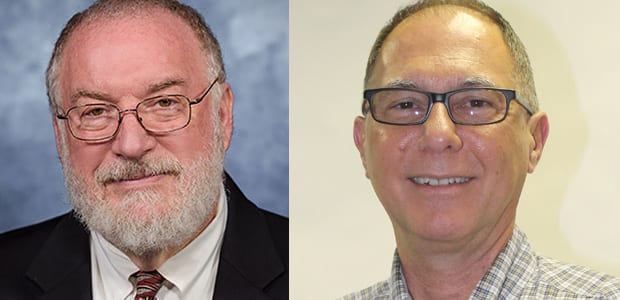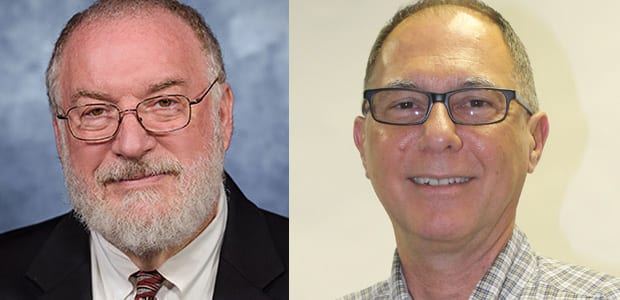
Richard-Scotch-, left, Roger-Wedell, right
DAVID TAFFET | Senior Staff Writer
Texas Pride Impact Funds has contracted with sociologists at University of Texas Dallas to do a statewide needs assessment of services for the LGBT community. Dr. Richard Scotch is heading that study.
“As far as we know, this is the first statewide LGBT needs assessment ever conducted,” said TPIF board member Roger Wedell.
TPIF is a statewide communities foundation established to benefit the LGBT community. The organization will channel philanthropy from LGBT donors and others to secure the future of LGBT communities across the state. So far, Houston, Austin and Dallas-Fort Worth have regional leadership groups.
Wedell said TPIF already has one donor-advised fund and has received a major gift from a donor to support start up activity and grant making. The first grants should be awarded in the first quarter of 2018, he said.
In addition, TPIF received a grant to cover the cost of the needs assessment. Wedell said the organization put out a request for proposals and were in conversation with two universities and one private company. The UTD proposal came closest to TPIF’s needs.
Wedell said they particularly liked that UTD was engaging graduate students and had created a graduate class around the study.
Scotch said that not only were grad students from his sociology department participating, but a number of students who were interested in the study have volunteered their time.
So far, Scotch said, the UTD research team has been working its way through a list of LGBT organizations across the state that TPIF compiled. That list includes HIV agencies, advocacy and social groups and churches and other religious organizations.
While the statewide assessment is interested in what’s going on across the state in all demographic groups, TPIF is paying special attention to five subgroups — those living in rural areas, people of color, the transgender community, youth and seniors.
In a few weeks, Scotch said, the UTD team will start conducting personal interviews and release a survey that can be answered online. He said he hopes to hold focus groups and would like at least one of those focus groups to center on those living in rural areas.
He said he wasn’t sure how many interviews would be needed.
“When you start getting the same story, you know you don’t need to go any further,” Scotch said. “We’re hoping we’ll get a good enough picture.”
He said he knows there are some things they’ll find: “Issues of aging, retirement and access to services. We know there are tremendous issues with youth. We’re open to be surprised that some issues are OK and some are worse than expected.”
The study won’t just focus on what the LGBT community is providing itself, but where needs are met through the generic service providers. He cited the study the Coalition for Aging LGBT is doing in Collin County, surveying assisted living and nursing home facilities to find out which are open to LGBT residents and actually have services that welcome them.
Scotch said a dozen UTD students who are involved are each assigned topics, such as “Do schools accommodate trans youth?” and “What stigma and support is coming from faith communities?”
Surveys will address 30 issues and ask participants: Is this a great need or not a need? Is this need being well met or not met?
In a month, Scotch expects to be receiving some preliminary results. The final study should be ready in September. Wedell said he expects TPIF will receive a wealth of information from the study.
Scotch commended the committee putting together the foundation for looking for evidence-based information.
“A lot of organizations try to gather information intuitively,” he said.
In the 1990s, Scotch was involved in a similar needs assessment for United Way. At the time, he found a number of LGBT people working for companies that contributed to United Way that were withholding their donations because no LGBT or HIV agencies were included. That led to Resource Center becoming a United Way agency.
Wedell said results from the needs assessment would help establish priorities in making grants, but this won’t be the last study.
“We anticipate contracting on further assessments either regionally or issue-based,” Wedell said.
This article appeared in the Dallas Voice print edition April 14, 2017.

